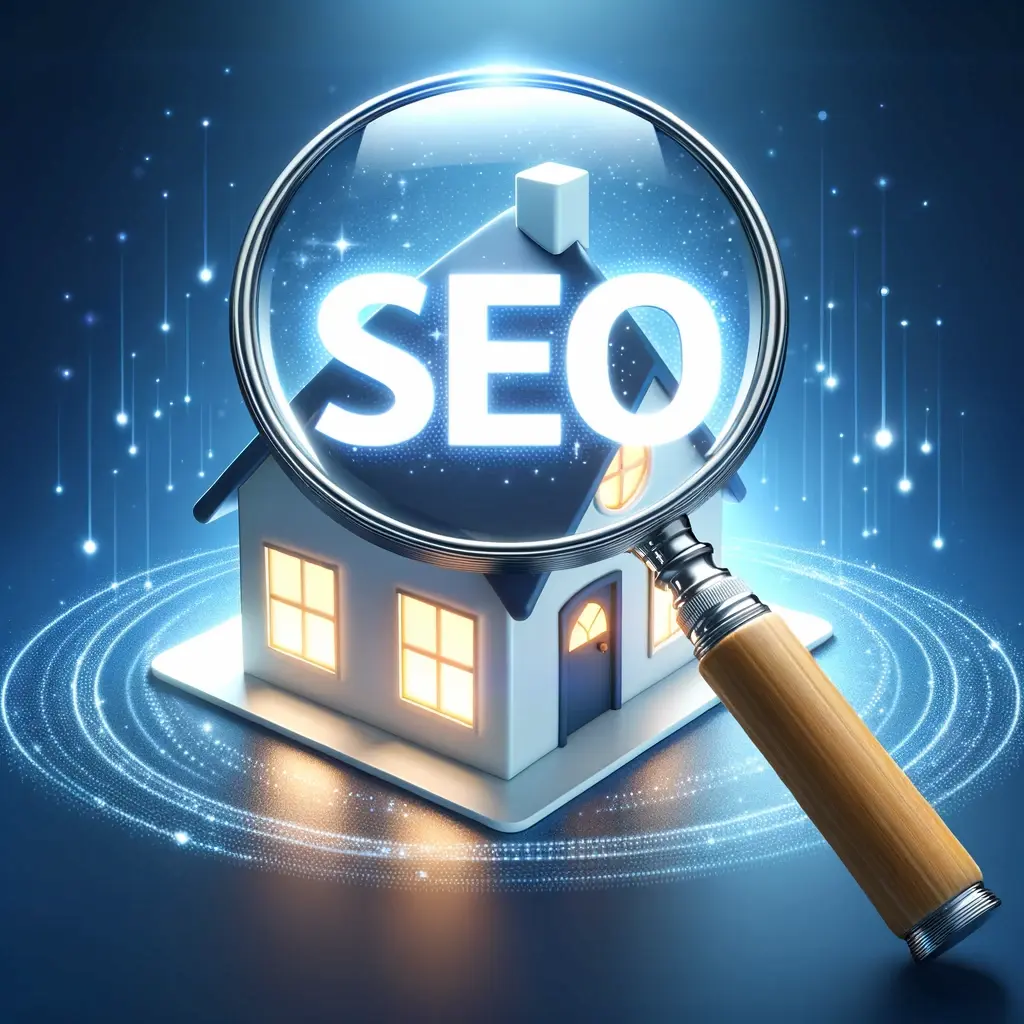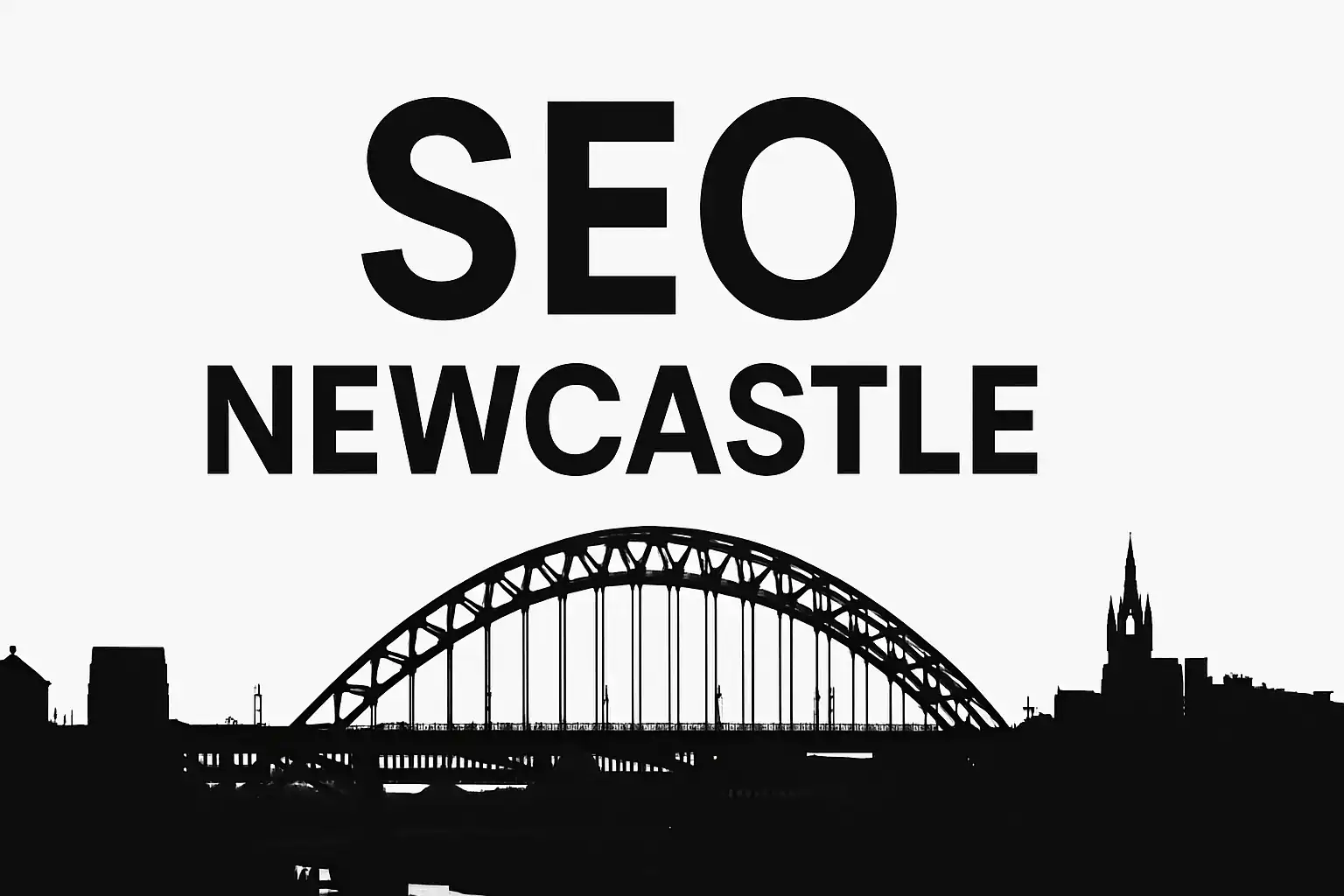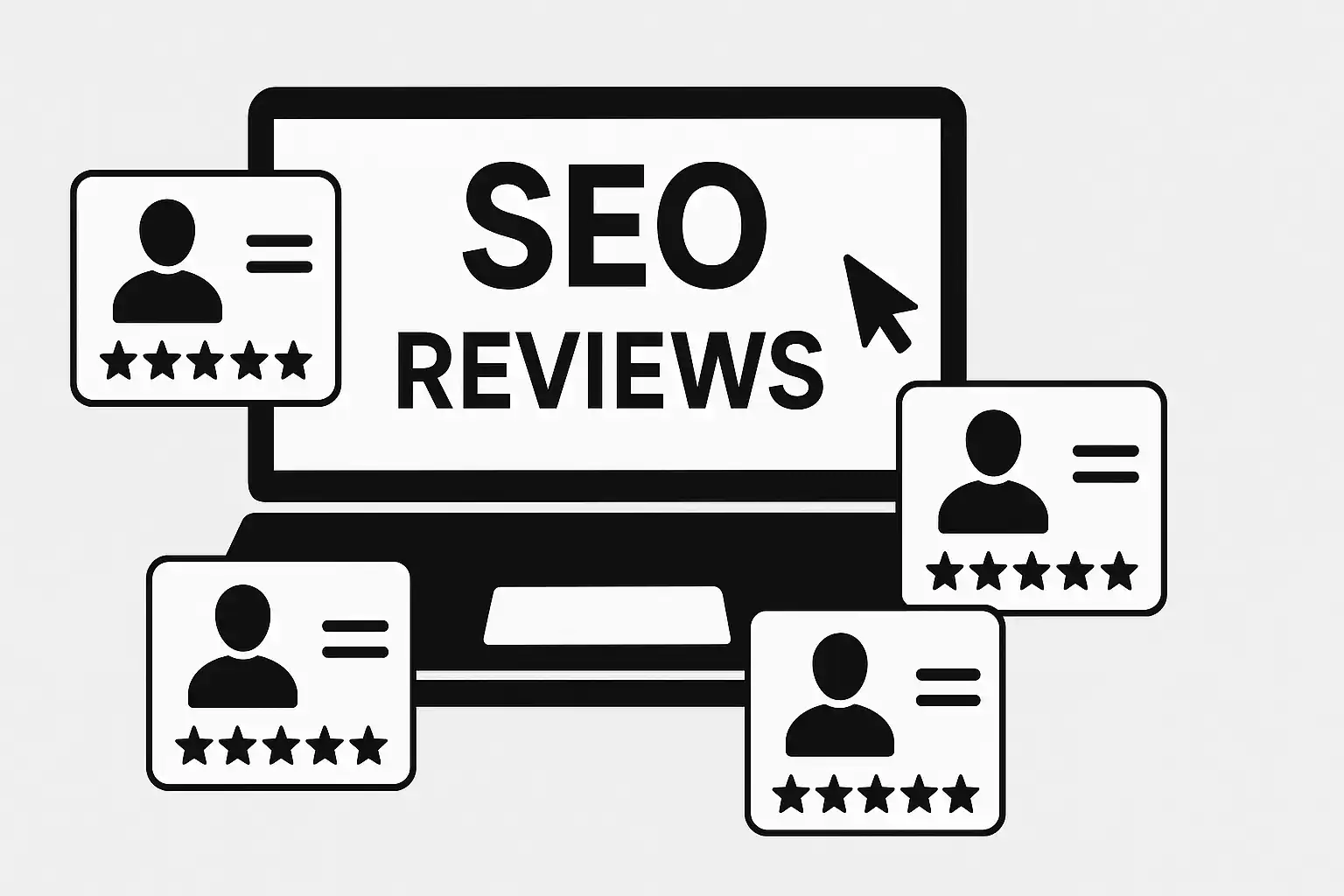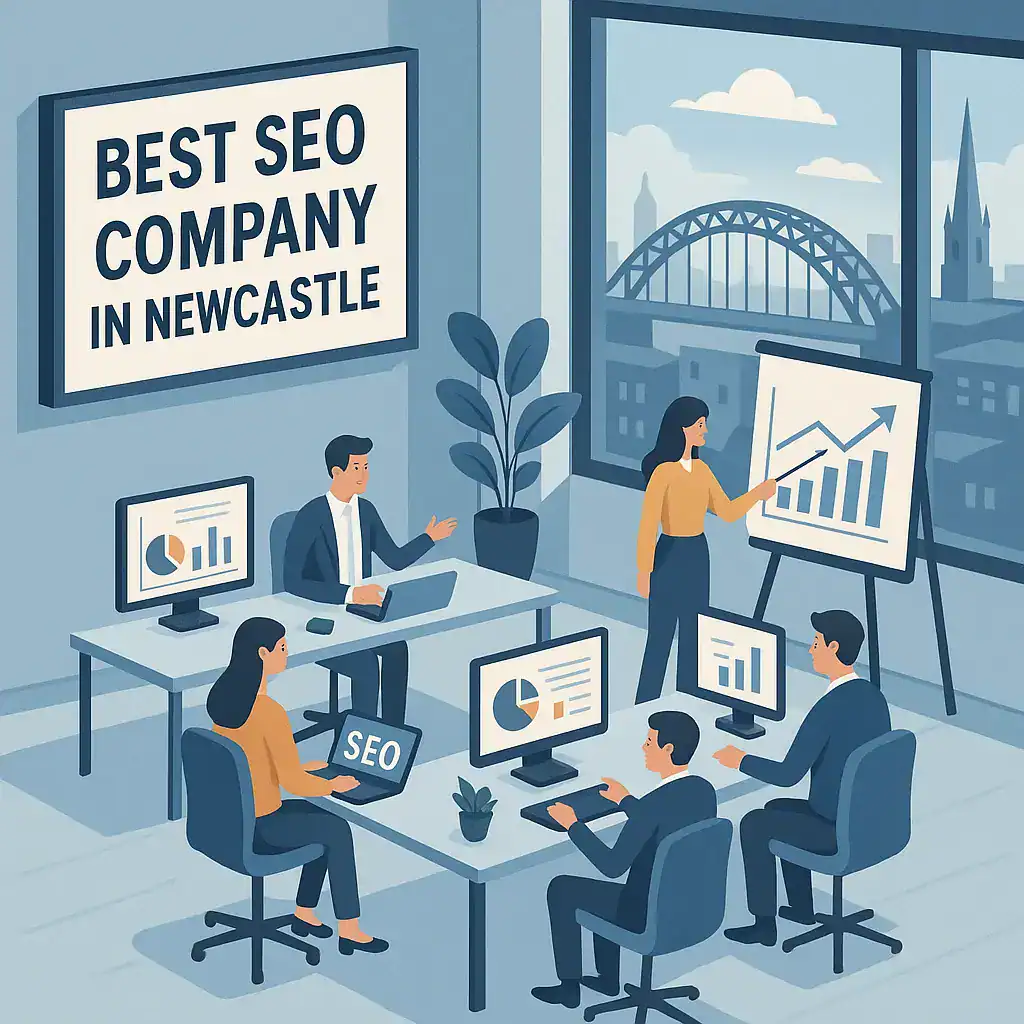You’re an estate agent, and you’ve heard SEO can boost your business. But what’s it all about?
This guide is your key to unlocking the power of Search Engine Optimisation(SEO). You’ll learn why SEO is a game-changer, how it works, and how to implement best practices.
Ready to elevate your online presence and attract more clients? Let’s dive into the world of SEO for estate agents!

You might wonder why SEO is a game-changer for estate agents. Simply put, it boosts your visibility, drives more traffic to your site, and improves client conversion rates.
We’re about to explore why these three points can revolutionise your real estate business.
In today’s digital landscape, it’s crucial to understand that a well-executed SEO strategy can increase your estate agency’s online visibility tenfold. Essentially, SEO is a game-changer for estate agents for a couple of reasons:
In a world where digital presence is king, understanding and leveraging SEO can significantly transform your estate agency’s reach and reputation.
To delve deeper into why SEO is a game-changer for estate agents, let’s consider its role in driving traffic to your site.
SEO isn’t just about visibility; it’s a powerful tool for attracting potential clients. When you optimise your site with relevant keywords, you’re signalling to search engines that your content is valuable to those searching for real estate services. This increases your chances of appearing in top search results, which can significantly boost your website traffic.
Moreover, SEO doesn’t just drive traffic—it attracts quality traffic. By using specific, targeted keywords, you’re drawing in individuals who are actively seeking the services you offer. This means you’re not just getting more visitors; you’re getting more potential clients.
That’s why SEO is a game-changer for estate agents—it’s a strategic way to grow your business.
Statistically, it’s always going to be cheaper to sell to existing clients whom you can nurture on your CRM, but you can’t rely solely on existing clients, so it is prudent to have some lead generation process to keep the phones ringing with new enquires.
Paired with the fact that enquiries via search have a higher conversion rate than any other marketing channel, driving quality traffic therefore has a direct correlation with how SEO can boost new client aquisitions for your estate agency.
SEO is a game-changer because it doesn’t just deliver more traffic; it attracts the right kind of traffic.
So, SEO doesn’t just increase your visibility; it amplifies your profitability by turning site visitors into clients. It’s the difference between having a storefront on a busy street versus one that is tucked away in a quiet cul-de-sac.
Now that you’ve seen how SEO can transform your business, let’s move on to the ABCs of SEO for real estate.
Let’s break down the ABCs of SEO for real estate.
You’ll begin to grasp the basics of SEO, see its tremendous impact on sales, and learn how to effectively optimise your estate agency’s website.
Mastering these elements is key to dominating the digital marketplace in the real estate industry.
In your journey as a real estate agent, grasping the basics of SEO is a crucial first step towards enhancing your online presence. SEO, or Search Engine optimisation, helps your website rank higher in search engine results, making it easier for potential clients to find you.
Here are some key basics to understand:
Now that you’ve got the ABCs of SEO under your belt, let’s move on to understand how this knowledge can positively affect your sales in the next section, ‘SEO’s Impact on Sales’.
So, how exactly does mastering SEO tactics boost your sales as a real estate agent?
Well, it’s all about visibility. When you optimise your website using SEO best practices, you’re essentially making your site more appealing to search engines. This results in higher search engine rankings, which translates into more visibility for your site.
Greater visibility means more potential clients are seeing your listings. And the more people see your listings, the higher your chances of closing a sale.
It’s also worth noting that SEO brings in quality traffic. These are people actively searching for real estate, making them more likely to convert into clients.
How can you, as an estate agent, optimise your website to harness the power of SEO?
Let’s delve into the ABCs of real estate SEO.
By following these steps, you’ll lay a solid foundation for your SEO strategy. Remember, SEO isn’t a one-time task; it’s an ongoing process.
Now, let’s move on to explore the digital shift in property hunting.

You’ve likely noticed the dramatic shift towards online property hunting. With this transition comes the challenge of ensuring your listings stand out in a saturated digital market.
That’s where understanding user intent, SERPs, and the importance of website optimisation becomes crucial for your success as an estate agent.
In the wake of technological advancements, there’s been a significant shift towards online property searches, transforming the traditional methods of property hunting. As an estate agent, you must adapt to this change to stay relevant.
The popularity of online property search can be credited to:
Understanding user intent and SERPs is crucial when you’re adapting to the digital shift in property hunting. As an estate agent, you must understand how potential buyers search for properties online. This isn’t just about keywords, it’s about anticipating what they’re looking for and how they phrase their searches. For example, instead of just ‘homes for sale’, they might search for ‘family homes near good schools’. This is user intent.
The pages that search engines display in response to a query are known as SERPs, or Search Engine Results Pages. The higher your website ranks in these results, the more visibility you get. Optimising your content according to user intent is key to improving your SERP ranking.
Navigating the digital haystack of property listings can pose a significant challenge as you adapt to the digital shift in property hunting. The sheer volume of information available online can seem overwhelming, but don’t worry, we’re here to help.
Here are two key challenges:
Overcoming these challenges involves developing a solid SEO strategy, understanding your target audience, and utilising the right digital tools.
As an estate agent, you’ll find that optimising your website is a vital part of adapting to the digital shift in property hunting. More people are now searching online to find their dream homes. That’s why it’s crucial to ensure your website is optimised for search engines.
This doesn’t just improve your visibility in search results; it also enhances the user experience. A well-optimized site loads faster, is easy to navigate, and delivers relevant content to visitors, making them more likely to stay and explore further.
Remember, your website is often the first point of contact for potential clients. If it’s not optimised, you’re missing out on valuable opportunities to attract and retain these clients.
In essence, website optimisation isn’t just important; it’s indispensable.

Let’s get down to the nuts and bolts of SEO.
You’ll need to grasp how SEO algorithms work, the crucial role of keywords, and the impact of website speed and mobile friendliness on your site’s SEO.
Additionally, understanding how to utilise SEO tools can significantly streamline your efforts and boost your online presence.
In your journey to master SEO for your estate agency, it’s crucial to grasp the inner workings of SEO algorithms. These algorithms are the rules that search engines like Google use to rank your sites.
To simplify it:
Improving your understanding of these algorithms can help you optimise your site better, thus increasing your visibility and driving more traffic to your business.
Without the right keywords, your estate agency’s website may struggle to gain visibility on search engines, making it crucial for you to understand their importance in SEO mechanics.
Keywords are the bridge between your content and the users searching online. They’re like the signposts that lead potential clients right to your digital doorstep.
Choose your keywords carefully, targeting those that your potential clients are likely to use when searching for estate agencies. Long-tail keywords, which are more specific, can also help you stand out from the competition.
Moving on from keywords, your website’s speed is another crucial factor you shouldn’t overlook in your SEO strategy. Slow loading times can frustrate users, leading to high bounce rates, a factor that negatively impacts your site’s SEO.
Here’s how speed affects SEO and user experience:
In essence, optimising your website’s speed improves the user experience, reduces bounce rates, and ultimately boosts your SEO.
Now, let’s take a look at the role of mobile-friendliness in your SEO strategy.
While you’ve nailed down your website’s speed, it’s equally important to ensure your site is mobile-friendly to boost your SEO rankings. In today’s digital world, a majority of people use their mobile devices to access the internet, making mobile optimisation a key factor in SEO.
Here’s a table to illustrate the impact of mobile-friendliness on your SEO:
| Mobile-Friendly Factors | SEO Impact | Actionable Steps |
|---|---|---|
| Responsive Design | High | Use a responsive website template |
| Fast Loading Speed | High | Optimize images, minimize code |
| Easy Navigation | Medium | Simplify menus, use clear CTAs |
| Legible Text | Medium | Use standard fonts, ensure sufficient contrast |
| Clickable Elements | Low | Make buttons and links large enough to tap |
Next, we’ll delve into the importance of utilising SEO tools to further enhance your website’s visibility.
By harnessing the power of SEO tools, you’re equipping yourself with the ability to boost your site’s visibility dramatically. SEO tools provide insights into what’s working, what isn’t, and where there’s room for improvement.
Consider these tools:

As an estate agent, you’ve likely noticed the increasing dominance of online property searches. Recognising the importance of search engine results pages (SERPs) and understanding the user intent behind property-related searches are now vital for your business’s success.
This digital shift in property hunting is changing the game, and it’s crucial you’re not left behind.
In today’s digital era, you’ve likely noticed a significant shift towards online property search, dominating traditional estate agent methods. This change is driven by a multitude of factors:
You can now review properties on your schedule, compare them side by side, and even take virtual tours. The online property search has indeed streamlined the property hunting process, providing you with access to a larger pool of listings. It’s a digital revolution that you, as an estate agent, should adapt to.
Now, let’s delve into the subsequent section, where we’ll discuss the ‘importance of SERPs’ in this online-dominated market.
Understanding the importance of Search Engine Results Pages (SERPs) can really ramp up your success as an estate agent in today’s digital-driven property market. SERPs are the new high streets for property hunters, and if you’re not visible there, you’re missing out.
| Importance of SERPs | How it Affects Estate Agents |
|---|---|
| Visibility | Higher ranking increases visibility among potential buyers. |
| Credibility | Being on the first page of SERPs boosts your credibility. |
| Traffic | More visibility leads to more traffic to your website. |
Building on the importance of SERPs, it’s crucial that you also grasp the concept of ‘User Intent in Searches’ in order to align your SEO efforts with the evolving behaviours of property hunters in the digital age.
Understanding user intent can be broken down into two main sub-categories:
You’ve mastered keywords, but SEO for estate agents has evolved beyond that. It’s time to grasp the significance of semantic search, understanding user intent, and the impact of updates like Hummingbird and BERT.
In the ever-evolving landscape of SEO, it’s crucial that you grasp the importance of semantic search, a critical component that goes beyond mere keyword usage. Unlike traditional methods, semantic search seeks to understand the intent behind a user’s search, offering more precise results.
This shift in SEO means you need to focus on creating high-quality, relevant content that aligns with user intent and provides comprehensive answers to user queries.
Additionally, optimising your site for rich snippets and structured data can enhance your visibility on search engine results pages (SERPs) and improve click-through rates (CTRs).
Moving on from semantic search, let’s delve deeper into the concept of user intent, a critical evolution in SEO that’s shaping how you strategize your content.
It’s not just about keywords anymore; it’s about understanding what your audience wants when they type in those keywords. Are they looking to buy a property, or just browsing? Do they want information on the housing market, or are they ready to hire an agent?
Understanding this intent can help you create content that meets their needs, which in turn boosts your visibility and credibility.
It’s a shift from just driving traffic to your website to attracting the right traffic. Remember, SEO isn’t just about being seen—it’s about being found by the right people.
Now, let’s take your understanding of user intent a step further by exploring the Hummingbird and BERT updates, two significant leaps in the evolution of SEO that go beyond mere keywords.
As we move forward, remember, it’s about providing real value, which we’ll discuss next.
Understanding these advancements in SEO is crucial, but your ultimate goal should be to provide genuine value with your content. You’re not just optimising for search engines, but for real people who are potential clients.
Here’s a simple table that illustrates the evolution of SEO:
| Old SEO | New SEO |
|---|---|
| Focused on keywords | Focuses on content quality |
| Saw users as search queries | Sees users as people |
| Relied on quantity of backlinks | Relies on quality of backlinks |
| Aimed for short-term success | Aims for long-term success |
In the realm of modern SEO, you’re better off focusing on context rather than stuffing your content with keywords. When search engines like Google evaluate your content, they’re looking for relevance and value to the user, not just a high keyword density.
Consider these tactics:
Let’s turn our attention to Local SEO, your secret weapon in the real estate industry.
By optimising for local searches and understanding the impact of reviews on rankings, you can get an edge in your market.
We’ll also touch on how Google My Business Optimisation can elevate your online presence.
Without the power of local SEO, you’re missing out on a key tactic that could significantly boost your estate agency’s visibility in your area. Local SEO is your secret weapon to outshine your competitors.
Particularly, it provides two main benefits:
Local SEO is a powerful tool that can help you dominate local search results, ensuring your estate agency stands out in a crowded market. It’s time to arm yourself with this secret weapon.
In the next section, we’ll delve into how to optimise for local searches.
Now, you’re probably wondering how to make the most of local SEO to enhance your estate agency’s online presence and draw in more potential clients, right?
Start by claiming your Google My Business listing. This free tool lets you manage your online presence across Google, including searches and maps. Include your agency’s name, address, phone number, and website. Also, use relevant keywords in your description to boost your visibility.
Next, gather positive reviews from happy clients. These not only build trust but also improve your search rankings.
Finally, optimise your website for mobile users. More people are searching for properties on their phones, so it’s crucial your site is mobile-friendly.
A significant number of positive reviews can dramatically boost your estate agency’s rankings in local searches, turning SEO into your secret weapon. Google’s algorithms favour businesses with high review counts and average ratings, rewarding them with prominent local search placement.
Here’s how reviews impact your rankings:
Engage with clients and encourage them to leave reviews. Don’t forget to respond; it shows you value their input and can even help mitigate negative reviews.
Turn SEO into your secret weapon today!
Optimising your Google My Business profile is another crucial aspect of local SEO, offering a potent tool to enhance your estate agency’s online visibility and reputation. It’s a priceless platform that makes sure potential customers can find you in local searches.
So, how can you take advantage of it?
First, claim your profile. It’s free and gives you control over the information displayed.
Next, fill out every detail. The more complete your profile, the higher you’ll rank. Include your address, opening hours, and contact information. Add high-quality photos of your premises and available properties.
Gather and respond to reviews, as they influence your ranking and customer decisions.
Lastly, stay active by regularly posting updates and news. Remember, a well-optimized profile attracts more local clients.
Harnessing the power of customer reviews can significantly boost your estate agency’s SEO efforts. Google’s algorithms favour businesses with high-quality, authentic reviews. They’re a testament to your service quality and trustworthiness.
Here’s how you can leverage them:
You’ve mastered keywords, but SEO doesn’t stop there. It’s time to tackle the concept of Semantic Search and explore how Google’s algorithm updates have shaped the landscape of SEO.
In this rapidly evolving field, staying ahead of the curve isn’t just beneficial – it’s essential.
In the ever-evolving world of SEO, you’ll need to grasp the concept of semantic search, which is a significant shift from traditional keyword-focused strategies. Here’s what it means:
By optimizing for semantic search, you’ll improve the relevancy and quality of your site’s traffic.
Now, let’s delve deeper into Google’s algorithm updates, another crucial aspect of modern SEO.
As an estate agent, it’s crucial for you to stay updated on Google’s algorithm changes, as they can significantly impact your SEO strategies. Google’s updates aim to refine the search results, making them more relevant and user-friendly. They’ve moved beyond mere keywords, now focusing on factors like content quality, mobile optimisation, and user experience.
For example, recent updates favour sites with fast loading times and high-quality, unique content. This means you must ensure your site is optimised for mobile viewing, loads quickly, and contains engaging, original content. Implementing these changes can significantly improve your rankings, driving more traffic to your listings.
While you might not consider blogging to be a key tool in your arsenal, it’s crucial for successful SEO in real estate. Blogging helps you establish authority, engage with potential clients, and most importantly, improve your website’s ranking on search engines.
Consider the following:
Let’s shift our focus to ‘Google My Business’, a powerful tool that can act as your local SEO catalyst.
You’ll see the enormous benefits of optimizing your Google Business Profile, ensuring your information is accurate, and using quality photos and reviews.
This can be your game-changer, transforming your online visibility and attracting more potential clients.
To boost your visibility in local searches, you’ll need to optimize your Google Business Profile, a key catalyst for local SEO. This process involves several steps:
Second, encourage your clients to leave positive reviews. Respond to them professionally and promptly.
You can’t underestimate the importance of maintaining accurate information on your Google My Business profile as it serves as a powerful local SEO catalyst for your estate agency. Correct details ensure potential customers find you quickly and easily. They also build trust and credibility, impacting your online presence positively.
Here’s a simple table to illustrate this point:
| Inaccurate Info | Accurate Info |
|---|---|
| Creates confusion | Builds trust |
| Lowers ranking | Boosts SEO |
| Reduces visibility | Increases visibility |
| Impacts credibility | Enhances reputation |
| Discourages potential clients | Attracts more leads |
In essence, the accuracy of your Google My Business information can either make or break your online success. Now, let’s move on to another crucial aspect – the role of quality photos and reviews in your SEO strategy.
While ensuring the accuracy of your information is crucial, it’s equally important to remember that quality photos and reviews significantly affect your local SEO as an estate agent.
Google loves rich content, and adding quality photos of your properties can greatly enhance your Google My Business listing. Quality photos should be high-resolution images that are well-lit and clear.
Reviews, on the other hand, provide social proof and can boost your reputation. Positive reviews can increase trust and conversions. To ensure quality reviews, you should encourage clients to leave reviews and respond to all reviews, both good and bad.
Incorporating these elements can improve your visibility and ranking. Now, let’s delve deeper into advanced SEO tips for estate agents.
You’re ready to take your estate agency’s SEO to the next level.
Let’s explore advanced tactics such as:
We’ll also touch on:
This will give you a competitive edge.
Harnessing the power of schema markup can elevate your estate agency’s visibility in search engine results, making it easier for potential clients to find your listings. By structuring your online data, you’ll provide search engines with more precise information about your business and the properties listed.
Here are two schema types you should use:
To boost your estate agency’s online presence, you’ll need to master crafting compelling meta descriptions, one of the advanced SEO techniques that can drastically improve your site’s click-through rates.
Meta descriptions are short summaries of your web pages that appear in search engine results. They’re your first opportunity to capture potential clients’ interest, so make them count!
Start by incorporating your main keywords naturally, but don’t stuff them in. Make sure to highlight the unique selling points of each property listing to pique interest.
Keep your descriptions concise (under 160 characters) and write in an active voice to encourage action.
After nailing down those compelling meta descriptions, it’s time we delve deeper into the realm of advanced keyword research techniques, another crucial aspect of SEO for estate agents you should master.
Next, we’re going to tackle the art of analysing competitor SEO strategies, another essential skill for you.
Dive right into analyzing your competitors’ SEO strategies, a strategy that will equip you with invaluable insights and give you an edge in the estate agency market. Identify their top-ranking keywords, backlink profiles, and content strategies.
Here’s a simple table to guide you:
| Competitor Analysis | What to Look for | Tools to Use |
|---|---|---|
| Keywords | Top-ranking keywords, search volume | SEMrush, Moz |
| Backlinks | Number, quality, and source of backlinks | Ahrefs, Majestic SEO |
| Content | Type of content, frequency of updates, engagement | BuzzSumo, Google Analytics |
When it comes to boosting your estate agency’s SEO, honing in on image optimization can significantly enhance your site’s visibility and performance. Images have a strong impact on page load times and user engagement, both of which affect your site’s SEO.
To get the most out of your images, consider these advanced tips:
Now let’s move on to creating value for the reader.
To boost your SEO as an estate agent, you’ve got to focus on delivering valuable content that resonates with your audience. This means producing content that’s informative and relevant and keeps them coming back for more.
Your posts should answer common questions, provide insights into the market, and offer helpful tips. Whether you’re crafting property descriptions, writing blog posts, or sharing market updates, always aim to educate and help the reader.
Remember, it’s not about you – it’s about them. So, think like your audience. What do they want to know? What problems can you solve for them?
You’re on the right track, implementing SEO best practices in your estate agency’s online presence. The real challenge lies in striking a balance between optimised content and authenticity, ensuring your site is easily discoverable while still engaging your users.
Let’s focus on how you can achieve this balance and maintain a consistent SEO strategy.
Navigating the balance between optimized content and authenticity can really ramp up your SEO success as an estate agent. You don’t want to come off as a robot, mechanically stuffing keywords into your web content. You’d rather be seen as a knowledgeable, trustworthy professional.
How can you strike the right balance?
Ultimately, it’s a dance between being found (SEO) and connecting with your audience (authenticity). Master this, and you’ll see your online presence grow.
When you’re looking to boost your discoverability and enhance user engagement, striking a balance between SEO best practices and authenticity can really pay off.
It’s not just about optimizing your content, but also about making it engaging and genuine.
By integrating relevant keywords into your content in a natural way, you’ll enhance your search engine ranking and increase visibility.
Authentic content resonates with users, keeping them on your site longer and encouraging them to interact more, which boosts your SEO even further.
Remember, consistency is key to maintaining your authenticity. Keep your content fresh, engaging, and true to your brand’s voice.
This way, you’ll not only attract more visitors but also keep them coming back.
Although it may seem daunting at first, consistently implementing SEO best practices can dramatically improve your estate agency’s online discoverability while preserving authenticity. By striking a balance between these two objectives, you’ll create a strong SEO strategy that delivers results.
Discoverability:
Authenticity:
Up next, we’ll discuss ‘e-e-a-t and quality rater guidelines: elevating content excellence’.
Understanding and applying E-A-T (Expertise, Authoritativeness, Trustworthiness) along with Quality Rater Guidelines can truly elevate your content quality and SEO rankings.
Emphasizing these elements not only demonstrates your expertise and authority in real estate but also builds trust in your content.
Let’s explore how you can effectively implement these strategies to give your SEO a significant boost.
You’ve got to grasp the concept of E-A-T (Expertise, Authoritativeness, and Trustworthiness), as it’s a crucial part of Google’s Quality Rater Guidelines and a key factor in elevating your website’s content excellence.
Understanding E-A-T can hugely impact your SEO strategy and boost your online presence.
In implementing Google’s Quality Rater Guidelines, your estate agency’s SEO strategy can significantly benefit from the principles of E-A-T, thereby elevating the excellence of your site’s content. E-A-T stands for Expertise, Authoritativeness, and Trustworthiness – three pillars that determine your website’s quality in Google’s eyes.
To get started, analyze your current content using the following table:
| Aspect | Evaluation | Action |
|---|---|---|
| Expertise | How knowledgeable are your authors? | Ensure content is written by industry experts. |
| Authoritativeness | Is your site considered a reliable source? | Gain backlinks from reputable websites. |
| Trustworthiness | Is your site secure and transparent? | Implement SSL, clear policies, and accurate contact information. |
This approach ensures your site’s content aligns with Google’s standards, improving your online presence and visibility.
Now that you’ve got a grip on what E-A-T means, let’s delve into how you can demonstrate expertise and authoritativeness in your content, further boosting your estate agency’s SEO. Here’s how:
By using these strategies, you’re not only showing Google you’re an authority in the real estate field, but you’re also providing valuable content to potential clients. This way, you’re elevating your content’s excellence.
Up next, we’ll discuss how to build trustworthiness in your content.
Building on the authority you’ve established, let’s turn our attention to cultivating trustworthiness in your content, a vital aspect of the E-A-T and Quality Rater Guidelines.
This means your content shouldn’t only be reliable but also credible. Use accurate data, referenced from reliable sources, and keep your content up-to-date to ensure it remains relevant.
Transparency is key, so provide clear about us and contact us pages, and disclose any affiliations.
Your reputation matters too. Online reviews and ratings can significantly impact your trustworthiness.
Let’s dive into how the E-A-T principles and Quality Rater Guidelines can elevate your content excellence and significantly improve your SEO rankings. As an estate agent, understanding and implementing these factors can skyrocket your online visibility.
In wrapping up, you’ve seen how crucial SEO is for your estate agency’s online visibility and lead generation. It’s not merely about stuffing keywords into your website’s content but creating quality, relevant content that truly resonates with your target audience. SEO strategy is about the long game, and it’s not something you can perfect overnight, but the results are certainly worth the effort.
By optimising your website’s SEO, you’re not just trying to please search engines, but you’re also improving the user experience for potential clients. Remember, a well-optimised website won’t only rank higher but also convert more leads.
Investing time and resources into SEO isn’t an option but a necessity for any estate agency wanting to thrive in the digital age.
You’re probably wondering about the timeframe for SEO strategies to yield results. Typically, you’d start noticing improvements after 4-6 months. But remember, it’s a long-term process, and patience is key to seeing significant changes.
You can implement SEO strategies with an in-house team if they’re skilled in SEO. However, hiring an SEO agency can be beneficial for their expertise and for staying updated with changing SEO trends and algorithms.
Yes, numerous SEO tools are beneficial for you. Google Analytics, SEMrush, and Moz are great for keyword research and tracking. Local SEO tools like BrightLocal can also help optimise your listings.
In the ever-changing digital landscape, you should review and update your strategies every 3-6 months. It’s crucial to stay current with trends and algorithm updates to maintain your visibility and competitive edge.
You may overlook keyword research, produce non-engaging content, or ignore local SEO. Avoid these by conducting thorough keyword research, creating engaging content, and focusing on local SEO to boost your online presence.



© 2007 - 2026 Black And White Boy SEO with From Blackandwhiteboy.com